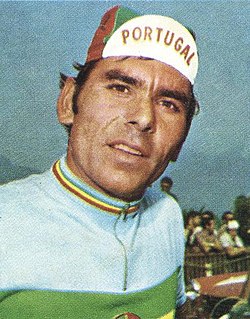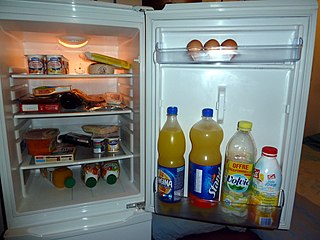
Joaquim Fernandes Agostinho, OIH was a Portuguese professional bicycle racer. He was champion of Portugal in six successive years. He rode the Tour de France 13 times and finished all but once, winning on Alpe d'Huez in 1979, and finishing third twice. He died after colliding with a dog whilst leading the Tour of the Algarve.

The 1969 Tour de France was the 56th edition of the Tour de France, one of cycling's Grand Tours. It took place between 28 June and 20 July, with 22 stages covering a distance of 4,117 km (2,558 mi). The participant teams were no longer national teams, but were once more commercially sponsored.

Gitane–Campagnolo was a French professional cycling team that existed from 1969 to 1977. Its main sponsor was the French bicycle manufacturer Gitane.
Skil-Sem was a French professional cycling team which competed during both the 1984 and 1985 seasons. It was the continuation of the Sem-France Loire team. Skil-Sem was the team with which the team's leader, Sean Kelly, dominated the sport in 1984. Another team member, the French rider Eric Caritoux, also won the Vuelta a España in 1984. The team was directed by Jean de Gribaldy.

Saint-Raphaël was a French professional cycling team that existed from 1954 to 1964. Its main sponsor was French apéritif brand Saint-Raphaël. From 1959 to 1961, a sister team existed, Rapha–Gitane–Dunlop.

Smith's was a Belgian professional cycling team that existed from 1966 to 1968. Its co-sponsor for the first two seasons and sole sponsor for the final season was the British company Smith's Potato Crisps.

Dr. Mann was a Belgian professional cycling team that existed from 1960 to 1970. Its main sponsor was proprietary medicine producer Dr. Mann. Its most notable victory was Herman Van Springel's win of the 1968 Giro di Lombardia.

Willem II–Gazelle was a Dutch professional cycling team that existed from 1966 to 1971. Its main sponsor was Dutch cigar maker Willem II and the co-sponsor was bicycle manufacturer Gazelle. Their most successful rider was Rik Van Looy, whose most notable wins with the team were the 1967 Paris–Tours, the 1968 La Flèche Wallonne and the 1969 E3 Prijs Vlaanderen. Harry Steevens won the 1968 Amstel Gold Race with the team.
Miko–de Gribaldy was a Belgian professional cycling team that existed from 1974 to 1976. The directeur sportif was former professional rider Jean de Gribaldy, who gave his name to the team. For the final year-and-a-half of its history, its main sponsor was French ice cream manufacturer Miko, whose part-owner, Louis Ortiz, was a friend of de Gribaldy. Its most notable victory was the 1974 Liège–Bastogne–Liège with Georges Pintens.

Liberia was a professional cycling team that existed from 1954 to 1962.
Wolber–Spidel was a French professional cycling team that existed from 1981 to 1984. It was a successor of the Puch–Sem–Campagnolo team of 1980. Notable victories include the 1982 Milan–San Remo with Marc Gomez and the 1984 Critérium du Dauphiné with Martín Ramírez.
Kamomé–Dilecta was a French professional cycling team that existed in 1966 and 1967. It participated in the 1966 Tour de France, with Pierre Beuffeuil winning stage 21.
Van Cauter–Magniflex–de Gribaldy was a Belgian professional cycling team that existed in 1972. It was the successor of the Belgium team Hertekamp–Magniflex and the predecessor of the Italian team Magniflex. It participated in the 1972 Tour de France.
The 1970 Critérium du Dauphiné Libéré, also known as the 1970 Criterium of the Six Provinces, was the 22nd edition of the cycle race and was held from 19 May to 25 May 1970. The race started in Terrenoire and finished in Avignon. The race was won by Luis Ocaña of the Bic team.
The 1976 Critérium du Dauphiné Libéré was the 28th edition of the cycle race and was held from 24 May to 31 May 1976. The race started in Grenoble and finished in Montélimar. The race was won by Bernard Thévenet of the Peugeot team.
The 1969 Critérium du Dauphiné Libéré, also known as the 1969 Criterium of the Six Provinces, was the 21st edition of the cycle race and was held from 25 May to 31 May 1969. The race started in Avignon and finished at Lyon. The race was won by Raymond Poulidor of the Mercier team.
The 1971 Critérium du Dauphiné Libéré was the 23rd edition of the cycle race and was held from 18 May to 23 May 1971. The race started in Avignon and finished at Montceau-les-Mines. The race was won by Eddy Merckx of the Molteni team.
The 1972 Critérium du Dauphiné Libéré was the 24th edition of the cycle race and was held from 30 May to 4 June 1972. The race started in Chalon-sur-Saône and finished at Avignon. The race was won by Luis Ocaña of the Bic team.











